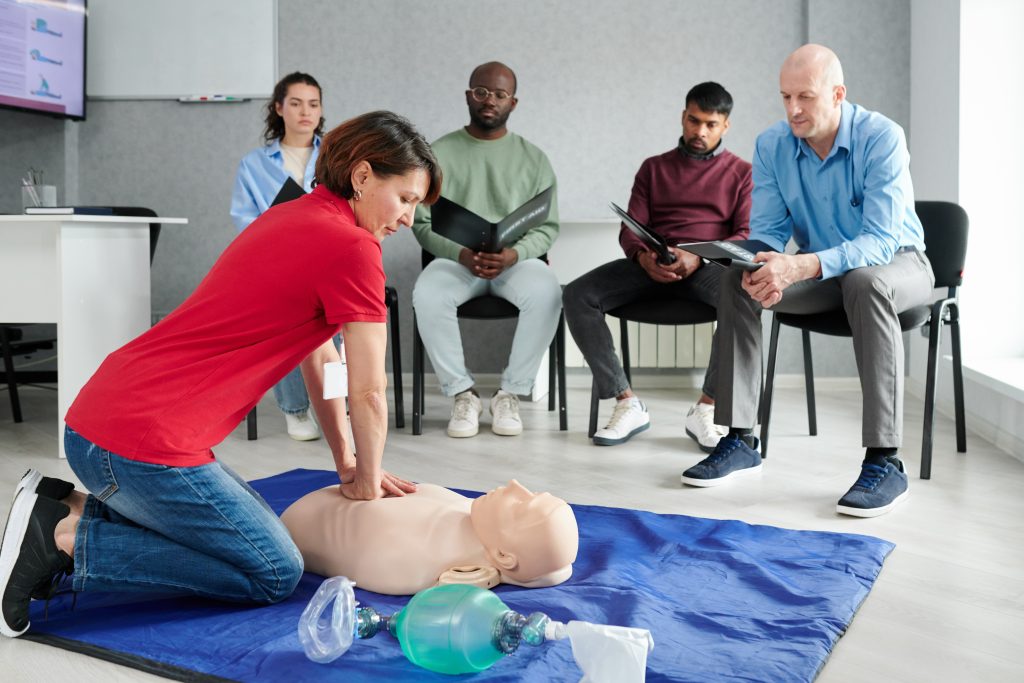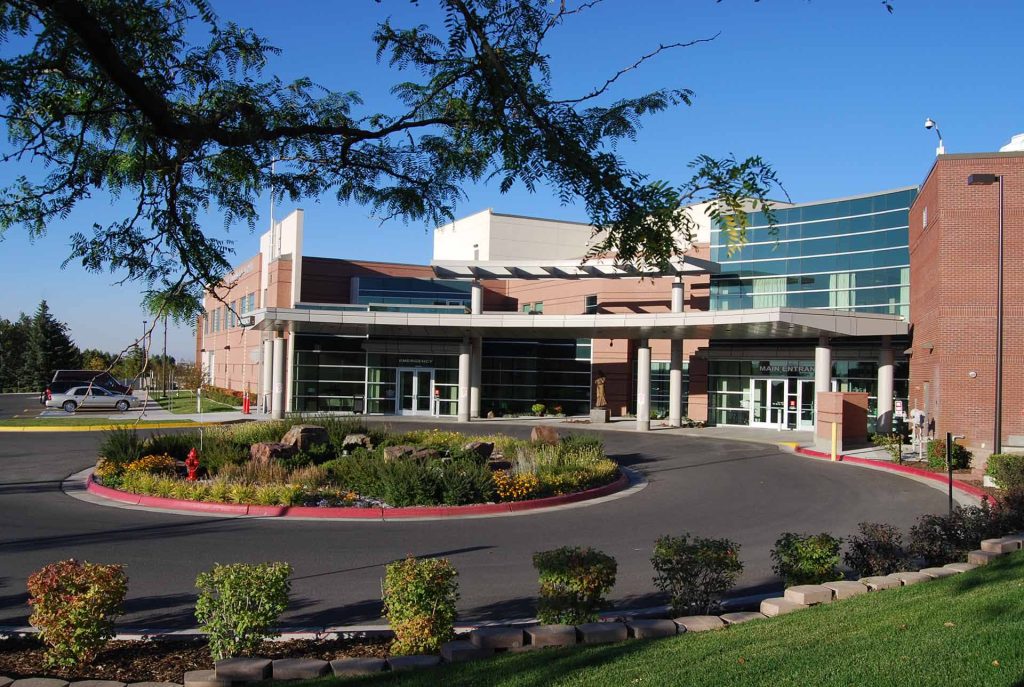CPR and Life Support Classes
CPR and Life Support Classes
Madisonhealth is proud to be a local American Heart Association (AHA) Training Center. The AHA Training Center serves as the regional liaison to the American Heart Association.
Course Guide
CPR and Life Support Classes at Madisonhealth
Madisonhealth is proud to be a local American Heart Association (AHA) Training Center.
The AHA Training Center serves as the regional liaison to the American Heart Association by implementing Emergency Cardiac Care science and education in the community, as well as maintaining the instructor database; performing quality assurance activities; and acting as a regional resource for AHA instructors.
As an authorized AHA Training Center, we provide support to Advanced Cardiovascular Life Support, Basic Life Support, and Pediatric Advanced Life Support training courses held in the area in addition to offering AHA courses.
Madisonhealth teaches all levels of CPR programs from the AHA. Whether you are a healthcare practitioner or a person with no medical background, we have programs that can help you save a life when needed. Contact Heather Burrell to learn more or to set up a class.
HEARTCODE® COMPLETE
at Madisonhealth (blended learning)
Introducing our HeartCode® Complete course option.
HeartCode® Complete allows learners to fully complete their BLS, ACLS or PALS training at their own pace, with courses delivered through the American Heart Association’s RQI1Stop platform. There are 2 parts to this program. Learners must complete both an online and hands-on skills session using our specialized “voice assisted manikins”. The program delivers detailed debriefing after each online learning module and real-time audio and visual feedback during skills sessions to ensure learners are receiving the highest-quality training possible. After completing their assigned course, learners earn their AHA e-card valid for two years.
By combining comprehensive online learning with hands-on skills practice and testing, HeartCode® Complete delivers consistent, quality resuscitation training across a healthcare organization at a pace that is right for every individual.
Basic Life Support (BLS) – Instructor Led
The AHA’s BLS Course is designed for healthcare professionals and other personnel who need to know how to perform CPR and other basic cardiovascular life support skills in a wide variety of in-facility and prehospital settings. The AHA’s BLS course trains participants to promptly recognize several life-threatening emergencies, give high-quality chest compressions, deliver appropriate ventilations and provide early use of an AED. Reflects science and education from the American Heart Association Guidelines Update for CPR and Emergency Cardiovascular Care (ECC).
BLS HeartCode Complete (Blended Learning)
HeartCode BLS uses a personalized adaptive algorithm that sets students on the most efficient path to BLS mastery. Students follow a continuously adapting learning path that is personalized by their own inputs: their performance and their self- reported confidence level related to each probe. The course content is presented in the form of self-directed learning content, probes, and Cognitive Assessment Activities. The student has a choice of completing a pre-hospital or in-hospital contextualized track. After completing the online portion, students complete the hands-on session with specialized “voice assisted manikins” located in their Education Center.
Advanced Life Support (ACLS) – Instructor Led
For healthcare professionals who either direct or participate in the management of cardiopulmonary arrest or other cardiovascular emergencies and for personnel in emergency response. The AHA’s ACLS course builds on the foundation of lifesaving BLS skills, emphasizing the importance of continuous, high-quality CPR. Reflects science and education from the American Heart Association Guidelines Update for CPR and Emergency Cardiovascular Care (ECC).
The ACLS Instructor-led course teaches the importance of preventing cardiac arrest, high-performance teams, early and continuous high-quality CPR, systems of care, recognition and intervention of cardiopulmonary arrest, post-cardiac arrest care, acute dysrhythmias, stroke, and acute coronary syndromes (ACS).
ACLS HeartCode Complete – (Blended Learning)
HeartCode ACLS uses a personalized adaptive algorithm that sets students on the most efficient path to ACLS mastery. Students follow a continuously adapting learning path that is personalized by their own inputs: their performance and their self- reported confidence level related to each probe. The course content is presented in the form of self-directed learning content, probes, and Cognitive Assessment Activities. After completing the online portion, students complete the hands-on session with specialized “voice assisted manikins” located in their Education Center.
Pediatric Advanced Life Support (PALS) – Instructor Led
PALS is geared towards healthcare providers who respond to emergencies in infants and children and for personnel in emergency response, emergency medicine, intensive care and critical care units. Upon successful completion of the course, students receive a course completion card, valid for two years. The PALS Provider Course aims to improve outcomes for pediatric patients by preparing healthcare providers to effectively recognize and intervene in patients with respiratory emergencies, shock, and cardiopulmonary arrest by using high performance team dynamics and high‐quality individual skills. The course includes a series of case scenario practices with simulations that reinforce important concepts.
PALS HeartCode Complete (Blended Learning)
HeartCode PALS uses a personalized adaptive algorithm that sets students on the most efficient path to PALS mastery. Students follow a continuously adapting learning path that is personalized by their own inputs: their performance and their self- reported confidence level related to each probe. The course content is presented in the form of self-directed learning content, probes, and Cognitive Assessment Activities. The student has a choice of completing a pre-hospital or in-hospital contextualized track. After completing the online portion, students complete the hands-on session with specialized “voice-assisted manikins” located in their Education Center.
Pediatric Emergency Assessment Recognition and Stabilization (PEARS)
This classroom, Instructor-led course teaches healthcare providers the foundational skills needed to assess, recognize, and participate in the initial management of respiratory and/or cardiovascular emergencies and cardiopulmonary arrest in pediatric patients. This Instructor-led classroom course aims to improve outcomes for pediatric patients by teaching students to assess, recognize, and manage respiratory emergencies, shock, and cardiopulmonary arrest until the child or infant is transferred to an advanced life support provider.
Neonatal Resuscitation Program
The Neonatal Resuscitation Program (NRP) is an educational program jointly sponsored by the American Heart Association (AHA). The course has been designed to teach an evidence-based approach to resuscitation of the newborn to hospital staff who care for newborns at the time of delivery, including physicians, nurses, advanced practice nurses, nurse midwives, licensed midwives, respiratory care practitioners, and other healthcare professionals who provide direct care during neonatal resuscitation.
S.T.A.B.L.E. program
S.T.A.B.L.E. is the most widely distributed and implemented neonatal education program to focus exclusively on the post-resuscitation/pre-transport stabilization care of sick infants. Based on a mnemonic to optimize learning, retention, and recall of information, S.T.A.B.L.E. stands for the six assessment and care modules in the program: Sugar, Temperature, Airway, Blood pressure, Lab work, and Emotional support. A seventh module, Quality Improvement stresses the professional responsibility of improving and evaluating care provided to sick infants.
TNCC
ENA developed and implemented the TNCC training certification for national and international dissemination as a means of identifying a standardized body of trauma nursing knowledge. The TNCC (Provider) is a 16 or 20-hour course designed to provide the learner with cognitive knowledge and psychomotor skills.
**In order to receive TNCC certification, you must be a Registered Nurse.**
These courses are taught by our community instructors.
Location:


